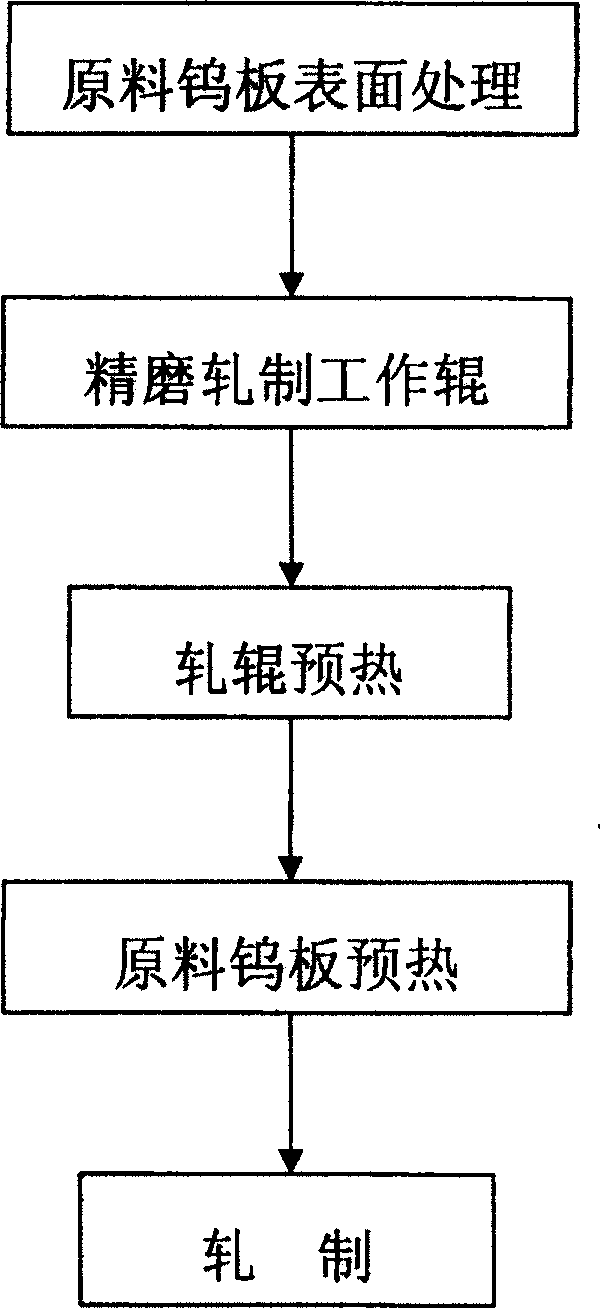A rolling method of small-coarseness high-light thin wolfram sheets
A roughness and high-brightness technology, applied in metal rolling, temperature control, metal rolling, etc., can solve problems such as the inability to reduce the roughness of tungsten sheets and poor surface consistency
- Summary
- Abstract
- Description
- Claims
- Application Information
AI Technical Summary
Problems solved by technology
Method used
Image
Examples
Embodiment 1
[0013] Take a raw tungsten plate with a thickness of 0.2mm, use 240# water sandpaper to grind the surface of the raw tungsten plate, and then use 1% NaOH+4% K 2 CO 3 +4% KCLO 3 + Yu H 2 O electrolyte, polished for 20min; using fine grinding and rolling work rolls with roughness less than 0.1μm; roll preheating temperature is 100°C; raw material tungsten plate preheating temperature is 100°C; surface treated and preheated tungsten plate is in Block rolling is carried out directly on the four-high reversing mill with preheated rolls without graphite and other lubricating materials. The rolling force is 40T in the initial stage, and then the rolling force is gradually increased, and the final rolling force is 80T. Thin tungsten sheets with a finished thickness of 0.15 mm are obtained by rolling, and the total processing rate is 25%. The surface is bright and consistent, and the surface roughness is 0.12 μm after testing.
Embodiment 2
[0015] Take a raw tungsten plate with a thickness of 0.25mm, use 240# water sandpaper to grind the surface of the raw tungsten plate, and then use 1% NaOH+4% K 2 CO 3 +4% KCLO 3 + Yu H 2 O electrolyte, polished for 30min; using fine grinding and rolling work roll with roughness less than 0.1μm; roll preheating temperature is 150°C; raw material tungsten plate preheating temperature is 200°C; surface treated and preheated tungsten plate is in Block rolling is carried out directly on the four-high reversing mill with preheated rolls without graphite and other lubricating materials. The rolling force is 40T in the initial stage, and then the rolling force is gradually increased, and the final rolling force is 60T. A thin tungsten sheet with a thickness of 0.2mm is obtained by rolling, and the total processing rate is 20%. The surface is bright and consistent, and the surface roughness is 0.14μm after testing.
Embodiment 3
[0017] Take a raw tungsten plate with a thickness of 0.2mm, use 240# water sandpaper to grind the surface of the raw tungsten plate, and then use 1% NaOH+4% K 2 CO 3 +4% KCLO 3 + Yu H 2 O electrolyte, polished for 10min; using fine grinding and rolling work rolls with a roughness less than 0.1μm; the preheating temperature of the rolls is 120°C; the preheating temperature of the raw tungsten plate is 150°C; the surface treated and preheated tungsten plate Block rolling is carried out directly on the four-high reversing mill with preheated rolls without graphite and other lubricating materials. The rolling force is 40T in the initial stage, and then the rolling force is gradually increased, and the final rolling force is 100T. A thin tungsten sheet with a finished thickness of 0.14 mm is obtained by rolling, and the total processing rate is 30%. The surface is bright and consistent, and the surface roughness is 0.1 μm after testing.
PUM
| Property | Measurement | Unit |
|---|---|---|
| surface roughness | aaaaa | aaaaa |
| surface roughness | aaaaa | aaaaa |
| thickness | aaaaa | aaaaa |
Abstract
Description
Claims
Application Information
 Login to View More
Login to View More - R&D
- Intellectual Property
- Life Sciences
- Materials
- Tech Scout
- Unparalleled Data Quality
- Higher Quality Content
- 60% Fewer Hallucinations
Browse by: Latest US Patents, China's latest patents, Technical Efficacy Thesaurus, Application Domain, Technology Topic, Popular Technical Reports.
© 2025 PatSnap. All rights reserved.Legal|Privacy policy|Modern Slavery Act Transparency Statement|Sitemap|About US| Contact US: help@patsnap.com

